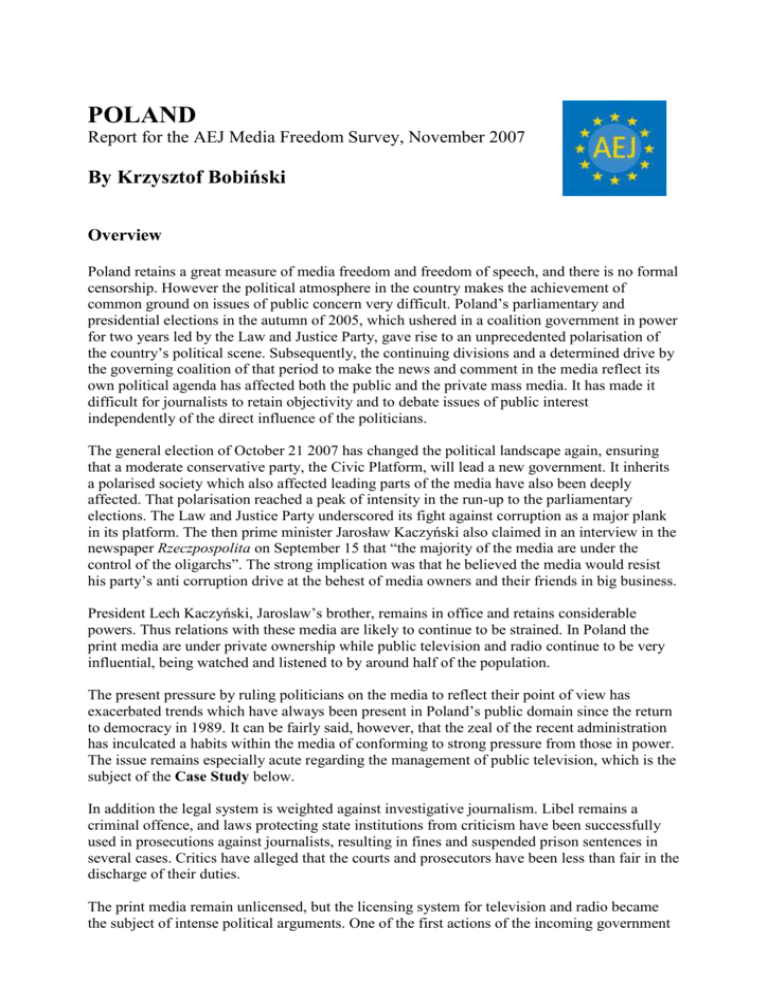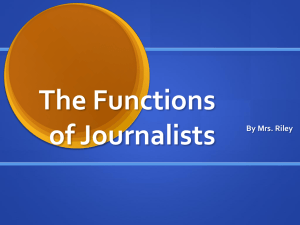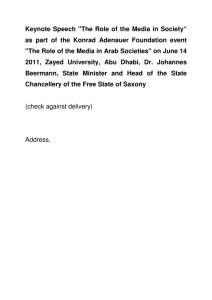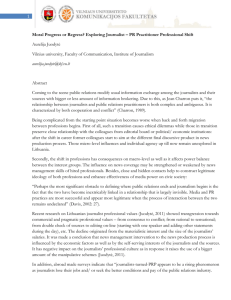Poland - AEJ UK Section
advertisement

POLAND Report for the AEJ Media Freedom Survey, November 2007 By Krzysztof Bobiński Overview Poland retains a great measure of media freedom and freedom of speech, and there is no formal censorship. However the political atmosphere in the country makes the achievement of common ground on issues of public concern very difficult. Poland’s parliamentary and presidential elections in the autumn of 2005, which ushered in a coalition government in power for two years led by the Law and Justice Party, gave rise to an unprecedented polarisation of the country’s political scene. Subsequently, the continuing divisions and a determined drive by the governing coalition of that period to make the news and comment in the media reflect its own political agenda has affected both the public and the private mass media. It has made it difficult for journalists to retain objectivity and to debate issues of public interest independently of the direct influence of the politicians. The general election of October 21 2007 has changed the political landscape again, ensuring that a moderate conservative party, the Civic Platform, will lead a new government. It inherits a polarised society which also affected leading parts of the media have also been deeply affected. That polarisation reached a peak of intensity in the run-up to the parliamentary elections. The Law and Justice Party underscored its fight against corruption as a major plank in its platform. The then prime minister Jarosław Kaczyński also claimed in an interview in the newspaper Rzeczpospolita on September 15 that “the majority of the media are under the control of the oligarchs”. The strong implication was that he believed the media would resist his party’s anti corruption drive at the behest of media owners and their friends in big business. President Lech Kaczyński, Jaroslaw’s brother, remains in office and retains considerable powers. Thus relations with these media are likely to continue to be strained. In Poland the print media are under private ownership while public television and radio continue to be very influential, being watched and listened to by around half of the population. The present pressure by ruling politicians on the media to reflect their point of view has exacerbated trends which have always been present in Poland’s public domain since the return to democracy in 1989. It can be fairly said, however, that the zeal of the recent administration has inculcated a habits within the media of conforming to strong pressure from those in power. The issue remains especially acute regarding the management of public television, which is the subject of the Case Study below. In addition the legal system is weighted against investigative journalism. Libel remains a criminal offence, and laws protecting state institutions from criticism have been successfully used in prosecutions against journalists, resulting in fines and suspended prison sentences in several cases. Critics have alleged that the courts and prosecutors have been less than fair in the discharge of their duties. The print media remain unlicensed, but the licensing system for television and radio became the subject of intense political arguments. One of the first actions of the incoming government in 2005 was to reform the licensing body, the State Committee on Radio and Television, staffing it with appointees of the ruling coalition parties and excluding representatives of the opposition who had previously been members of the committee. This led politicians from the ruling parties to treat the publicly-owned national and local, mass media as “theirs”. The privately-owned TV and radio media have kept up a constant stream of critical reporting in their outlets, but have constantly had to worry that they could face a backlash from the authorities which might put their broadcasting licences at risk. In addition the existence informal black lists of commentators invited to appear in the public broadcast media has in effect meant the disappearance of some figures form the airwaves, while others who were closer in spirit to the government in power, who were previously marginalised, returned to public view. Case Study: Manipulation of news and comment in public television All three of Poland’s main television broadcasters – the publicly-owned television TVP, and the private stations TVN and Polsat broadcast news and current affairs programmes, and each also has a 24-hour news channel (TVP3, TVN24 and Superstacja respectively). The three channels of TVP have a commanding position, enjoying the loyalty of around 60 per cent of the viewing public. Its main news programme, Wiadomości, is watched daily by around four million people, compared to three million each for TVN and Polsat. TVP is funded by a licence fee paid by each household owning a TV set as well as by significant advertising revenues, while the private broadcasters are dependent on advertising revenues alone. This means that TVP remains a significant opinion former and is seen as such by the politicians. It is also under a formal obligation to present a balanced view of current events, enabling viewers to form judgements on political and social developments in the country. Given the intense pressure exerted by Polish politicians of all the main parties to influence the content of news and current affairs comment on public television, it is questionable whether the goal of achieving a politically balanced debate on issues of public concern for Polish society is at all feasible. Indeed the conversations held by this reporter on the issue in Poland could well have been conducted at times in both Italy and France, which also face questions about the independence of their national broadcasting organisations. This suggests that media which are subject to the decisions of politicians will always be open, to some extent, to interference by those politicians and by the government bureaucracy. In Poland the professional journalists’ associations and trade unions are weak. Both are outspoken in defending the jobs of sacked members, but they rarely protest over issues of editorial independence. As a result, journalists and editors are extremely vulnerable to outside pressure from politicians, especially those in the ruling coalition. In effect the government which came to power in the autumn of 2005 rejected the broad liberal consensus that had existed in Poland regarding both internal and foreign affairs since 1989. That government defined its role as one of clearing the country of lingering communist influences and corrupt networks in business and the professions. It also made no secret of its determination to clear the publicly owned media of people employed since before 1989, including the managers appointed by previous administrations. It sought to replace them with those in tune with the government’s thinking and policies. 2 Personnel changes have been made in the past two years but the process of establishing control has not been easy. The initial appointments to top management position in TVP brought in figures sympathetic to the new government who also wanted to retain editorial independence and balance. These appointments were later undone. The same commitment to impartiality was strong among rank and file journalists, who also sought to resist the political pressures. However a process of attrition whittled away the opportunity for real editorial independence. This was done in the following ways:Departmental heads were replaced with younger, less experienced journalists who supported the government line. These new managers ensured that politicians speaking for the government were given ample exposure and were not set against spokespeople from rival parties who might outshine them. In the day to day news coverage efforts were made to minimise incidents which might reflect badly on the ruling party. The term “political officer” has entered into TVP’s everyday vocabulary, revealing how this mechanism came into force in the world of public broadcasting. Journalists who resisted efforts to slant the news were not sacked but transferred to other posts or left on very low pay and not assigned tasks which would allow them to earn higher wages. One TVP employee said “I consider this to be the single most manipulative mechanism in TVP. Thanks to this it is possible to break people by threatening them with a bread line income. When it happens, people either vegetate or resign. In the latter case management is able to get rid of them without having to sack them”. This pattern of behaviour means that self-censorship has become prevalent. Journalists have a sixth sense as to the people who should be invited to appear on TV and those who should not. “It’s in the culture of the place” says another TVP staff member. “No formal blacklists exist on paper, but a passing remark or raised eyebrow can be enough for a producer to know that the appearance of a particular person on the screen could damage their career.” This mechanism also works the other way. People once marginalised by the previous liberal consensus appeared more often on TV. This has applied to intellectuals with conservative views on matters of morals, or with nationalist opinions with respect to Poland’s neighbours like Russia or Germany. Supporters of the EU became less prominent then before, while its critics received more exposure. TVP has also seen a major influx of journalists trusted by the Law and Justice Party-led government from outside the organization, who work on a casual basis but present and appear in programmes regularly. This meant that de facto a change in personnel was accomplished without sackings on a major scale. Many of the same mechanisms appeared in the state radio organisation Polskie Radio. Conclusion and Future Action: The situation described here poses the important question of whether in a young democracy such as Poland’s publicly owned media are to serve the interests of the viewers as a whole or are to be treated as the property of the politicians ruling the country at any given time. Present experience suggests that the latter is now the case. This does not serve either society at large, the credibility of the broadcast institutions involved or the ethical standing and professional morale of the journalists who work in them. The country has experienced a politicisation of the public broadcasting media under governments of 3 various complexions in recent years which has effectively prevented the presentation of a fair balance of political developments and views. It is imperative for the freedom and independence of Poland’s media as a whole that laws and practices are swiftly put in place to correct the aberrations of the past. ________________________________________________ EXTRACT FROM FEBRUARY 2008 UPDATE Poland Krzysztof Bobiński The AEJ’s report on Poland for last November’s Survey described in detail how a systematic political bias was allowed to develop within the country’s public broadcasting system under the last government, headed by the Law and Justice Party. That report demonstrated how that failure to maintain impartiality in public TV and radio represents a severe distortion of the overall media landscape in Poland. The change of government following elections in October 2007 has not yet brought about any decisive improvements, and public confidence in the public broadcasting system remains at a low ebb. The broadcast media licensing body, the State Committee on Radio and Television (KRRiT), which is dominated by appointees and supporters of the outgoing government, remains in place. So do the chief executives of publicly owned television, TVP, and of public radio, Polskie Radio, who were chosen by supervisory boards which were themselves appointed by the KRRiT. The two supervisory boards, whose terms of office are due to end in 2009, are alone empowered to replace the heads of TV and radio. These boards owe their loyalty to the previous government. Only a change in Poland’s media laws could bring about an early change in their composition. This means that editors and journalists who have known sympathies with the previous administration remain in key positions in the publicly owned broadcast media. However, in response to strident criticism of the evident bias in their programming, both TVP and Polskie Radio have of late given more airtime to commentators identified with other political options who were previously shunned. Meanwhile the new government headed by Donald Tusk and his pro-business centrist Civic Platform (PO) has drafted a new broadcast law which would shift licensing decisions from the KRRiT to the Telecommunications Regulator (URE) whose head is appointed directly by the prime minister. Under the proposed new law, the KRRiT would be left with a monitoring function. The system of appointing its members is also to be changed. This would mean that the seven members of the KRRiT (not five as at present) would continue to be chosen by the two houses of parliament and the president, but only from among candidates who have secured the approval of organisations of academics, journalists or other relevant professions. The KRRiT would also continue to make appointments to the public media’s supervisory boards, and would share responsibility with the boards for senior management appointments.. 4 Civic Platform has also flirted with a more radical change – the idea of scrapping the TV and radio licence fee which all owners of radio and TV sets are required to pay. The licence fee system provides guaranteed funds for the public service broadcast media, but they also enjoy large advertising revenues. By the end of last year a mere 40% of the population were actually paying the fee, and the amount charged to each household had also fallen by 30% compared with twelve months earlier. The proposed changes have attracted criticism from Civic Platform’s opponents in the previous government coalition that the new government is seeking in its turn to dominate the public media. Government supporters have failed to answer these charges convincingly. The desultory discussion in Poland’s print media on the merits of having an impartial public broadcast media free of partisan political control has failed to fire the public imagination. A forthcoming congress of the Stowarzyszenie Dziennikarzy Polskich (SDP), the journalists’ professional organisation, has however set in train a movement for renewal of the SDP whose leadership had identified with the practices of the previous government. The “reformers” have set themselves the target of turning the SDP into an effective lobby for achieving a reliable system of impartiality in the media. ________________________________________________________ EXTRACTS FROM THE NOVEMBER 2008 REPORTS Public Broadcasting: The Case of Poland By Krzysztof Bobinski Report for the Association of European Journalists – an observer member of the Council of Europe Steering Committee on the Media Linz, November 2008 Journalism in Poland is not a dangerous profession. Investigative reporters do not have to fear reprisals at the hands of murderous thugs. The worst that can happen to outspoken editorialists is that people in positions of power will fail to return their calls. Politicians do not actively seek to interfere with media content. There is no censorship. Journalists have enjoyed and continue to enjoy high prestige in the society, just below teachers who come top of the list. Journalists are better esteemed than priests, judges or politicians. Society at large tells opinion pollsters that it is happy with the content provided by television and radio – around four fifths of respondents say they are satisfied with the daily media fare they receive. Yet at the same time, I would argue, the media in Poland, especially the state ownedi broadcast media, are in crisis as they are failing to provide the information the citizens need to have to be able not only to understand the events happening around them but also the challenges facing their society, at home and abroad. This is important for, if the media fail to perform this task 5 then democracies cannot function properly and sooner or later will degenerate to become a threat either to themselves or to their neighbours. Between 2005 and 2007, Poland saw the rise and fall of an authoritarian government which saw the media as inimical to its interests. As a result it sought to bring state owned television and radio entirely under its control. Key posts in the state owned broadcast media were filled by declared supporters of the government. Current affairs programmes relayed government concerns. Government friendly commentators became regular guests in the public media. The government also made no secret of its hostility to independent commercial broadcasters. In the autumn of 2007, that government was voted out of power and replaced by a new administration which promised to install a media regime in the state owned sector which would guarantee the independence of broadcasters. However, this has not happened. Laws regulating appointments in the public media passed by the previous administration made it very difficult to replace their appointees. An amendment to the media law, which would make it possible for those appointments to be reversed, is impossible because the President, who sympathises with the previous administration, will veto changes. The present government does not have the three fifths majority in Parliament needed to override the veto. The result is stalemate. The underlying problem is that the present government has also failed to make a case for a public broadcasting system that would provide society with information and insights by allowing it to make judgements on the choices lying ahead. In a word, it has failed to signal that it wants to interact with an informed voting public. The impression which arose when the new government made its case for changes in the media law was that they were merely interested in replacing "their" people with "their own" people. Unfortunately, the same can be said of the journalistic community working in the state owned media. Years of overt and covert pressure by politicians and other pressure groups have taught journalists how to play these groups off against each other and as a result defend themselves against their own management. The idea that public broadcasting should provide a service to viewers and listeners in the interest of building a viable democracy is weak among journalists and their professional organisations. Subsequent heads of television current affairs programmes, operating under various governments, complain that it is impossible to discipline journalists because, when threatened with sanctions, they appeal to outside pressure groups for support. "When I tried to sack someone I had calls from influential politicians, or influential representatives of the church or the secret services depending on which institution that journalist had links with. It was impossible to manage the unit," said one head of public television news at a workshop on the issue. Others had exactly the same experience. Paradoxically, the present stalemate in Poland works for a presentation of a certain diversity of opinions in the public media – not because the system is designed that way, but because of the uncertainty of the political winds. Journalists have developed a sixth sense about the options they are expected to present on the air. "The old regime is still strong in the media so people sympathetic with the previous government's point of view are invited but journalists are also aware that the situation could change so they invite people representing points of view that are in tune with the present government which might manage to overturn the present management of the public media. That way you get pluralism," says a working television journalist. 6 Thus there are high levels of cynicism tinged by opportunism in the public media, and management is weak. What is lacking is strong leadership and an understanding of the ideal expressed by Lord Reith – the first Director-General of the BBC in the UK – of a public broadcasting mission to "inform, educate and entertain". What is worse, there are no obvious candidates ready to perform such a role, even if changes in management were possible, nor are the journalists or their professional organisations articulating such a need for the broadcast media. This is a measure of the crisis in Polish journalism. At the same time, laws protecting media freedom are in place. Regulations obliging the public media to provide impartial information are also in place. However, the broadcast media licensing body, the KRRiT, an official watchdog, shows little interest in ensuring that they are respected. The state owned media do not abide by any BBC-style code of conduct for jurnalistic work, which might guard their editorial independence against political pressures. If such a code or editorial guidelines exist at all in Polish public broadcasting, they are evidently not enforced. There is also little or no training designed to ensure journalistic impartiality. In effect these failures run counter to the Council of Europe’s Parliamentary Assembly’s Resolution 1636 on media standards of fairness and professioalism adopted on 3 October this year. The current head of Polish Television (the state broadcaster) was, before taking up the post, the chief minister in the present President’s office. It is the President himself who is threatening to veto changes in the system that could enforce a degree of impartiality. The public media operate in competition with a commercial broadcasting sector which increasingly treats information as entertainment and the process of dumbing down continues apace. "Morning planning meetings are dominated by a search for participants in current affairs programmes who will go for each others' jugulars. This is what the viewers want. This is what puts the viewing figures up," says one senior journalist in a commercially owned 24-hour news programme. "We are constantly looking for people and themes which will set the atmosphere alight," he adds. As the state owned media also carries advertising and is seeing licence fee paymentsii constantly declining, the fight for audience share means that it is increasingly difficult to touch subjects which maybe important but are seen as dull. As a result, television current events are becoming "tabloidised" and coverage of foreign events suffers. This is while Poland has as many as four round-the-clock television news channels, three commercial and one state owned. Yet they are still short on "serious" coverage. "We have BBC World and Al Jazeera on all the time in our news room; we've given up on the Polish stations," says the foreign news editor of a major print daily. The decline of serious coverage in the western media is a parallel development. When Poland shed official censorship in 1989, broadcasters like the BBC were still able to present a credible model. The memory of foreign broadcasts like Radio Free Europe providing information to the country was strong. Countless conferences and study tours to the west post-1989 extolled the virtues of a media model that provided comment-free, objective information. Now that inspiration is much weaker as western media have themselves dumbed down to a considerable extent. The trend abroad is also towards commercialisation. The problem thus transcends Poland and centres on the issue of the state of the media in the western world and the functions that it should perform. It is thus an integral part of the Association of European Journalists’ ongoing debate on fundamental failings and challenges for media freedom in Europe. Media that allow themselves to be governed solely by 7 commercial considerations and to cater to the widest of popular taste are media that no longer educate and inform but merely entertain. This is the trend in Poland, but not only here. If four fifths of Poles says they are satisfied with the fare they are supplied by their media, that merely reflects the fact that Poles like to be entertained. The point at issue is whether their media is serving the cause of a viable democracy. The two issues are interrelated. A democracy cannot function well if it does not have media that inform and educate. Free media cannot function well unless they operate within the framework of a viable democracy i I use the terms "state owned media" and "public media" interchangeably. The formal situation is that these media are owned by the Treasury, thus by the state supposedly in the name of the public. The issue of whom the media should serve is fuzzy, however. Should they serve the state, i.e. the politicians or the administration currently in charge or the public at large which pays taxes and is entitled to hearing and seeing all points of views on key issues. This question remains unresolved, hence the decision to use the two terms interchangeably is a conscious one. ii The debate on the future of the licence fee is part of the wider discussion on the public media in Poland. The current pro-business administration would like to cut out the licence fee or change the way it is used to subsidise the public media. The latter are in any case becoming increasingly reliant on advertising revenue. However, the financing issue is, in my view, subordinate to working out a model for the public media and a fundamental reform of management and training methods in those media. ______________________________________________ Public Trust in the Media in Poland By Krzysztof Bobinski Report for the Association of European Journalists Linz, November 2008 Poles have since 1989 by and large trusted what they read in the newspapers and what they see and hear in the electronic media. According to a public opinion poll by CBOS published in the summer of 2003, half of all Poles felt that journalists could be relied on while a mere 16% felt that they could not be trusted. A clear majority – 59% – also believed that journalists should conduct investigative reporting and publish the results "even if everything was not entirely clear". Thirty-four percent said such reports should be made public "only if everything was known about the case". This degree of trust in journalists translates into high prestige for the profession. In a study done by TNS-OBOP, another polling company, in the summer of 2005 teachers came top of the list of most respected professions with 59% support while journalists came second with 48%. These high results (respondents were asked to point to three professions they respect) contrast with ratings achieved by the clergy – 29%, judges – 12% and politicians – 2%. 8 More recent studies show that Poles are relatively happy with the performance of the broadcast media as such. In September 2008 state-owned television had an 82% support rating (two other commercial stations, Polsat and TVN, checked in at 79%) while 77% were happy with state radio (the two main commercial stations RMF FM and Radio Zet saw 71% and 70% satisfied with their rating). These high results have remained stable over the past three years irrespective of the government in power and the level of de facto manipulation of the state controlled media by ruling politicians. However, these polls reflect satisfaction with the entire content of the broadcast media – game shows, soap operas, concerts and films as well as current affairs broadcasts. At the same time, broadcasters are doing better than other key institutions. In September 2008, a mere 21% of Poles thought that the Sejm, the main parliamentary chamber, was doing a good job, while the President was given an approval rating of just 31%. 9






